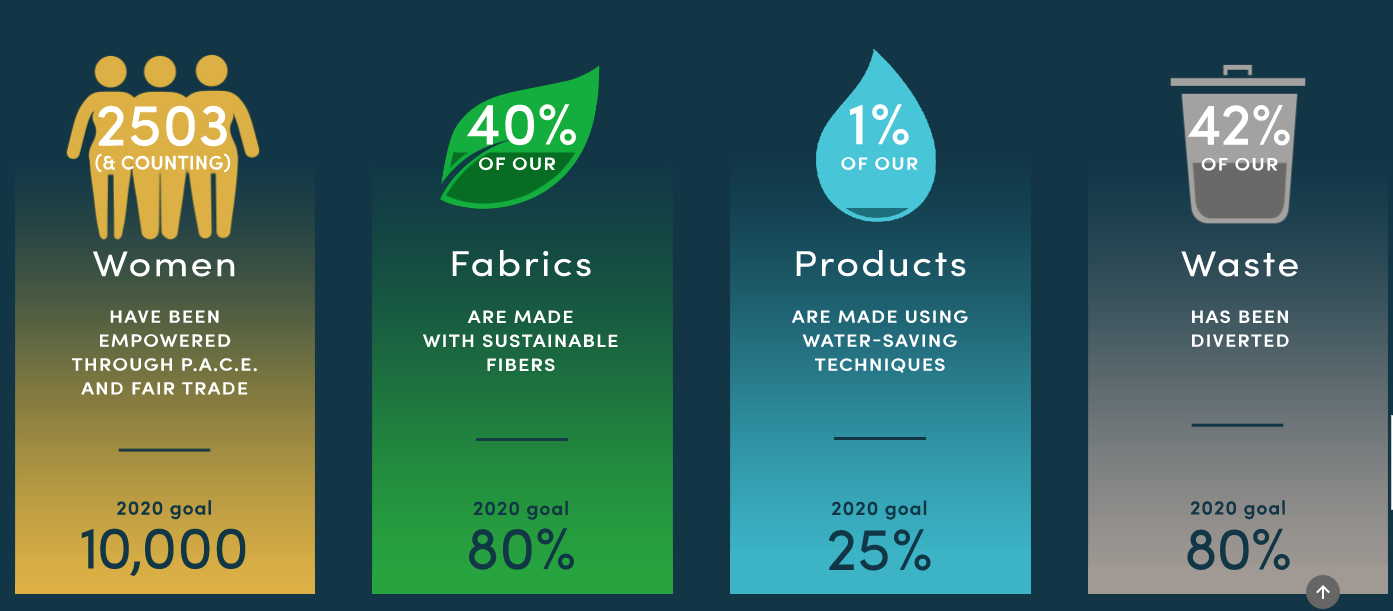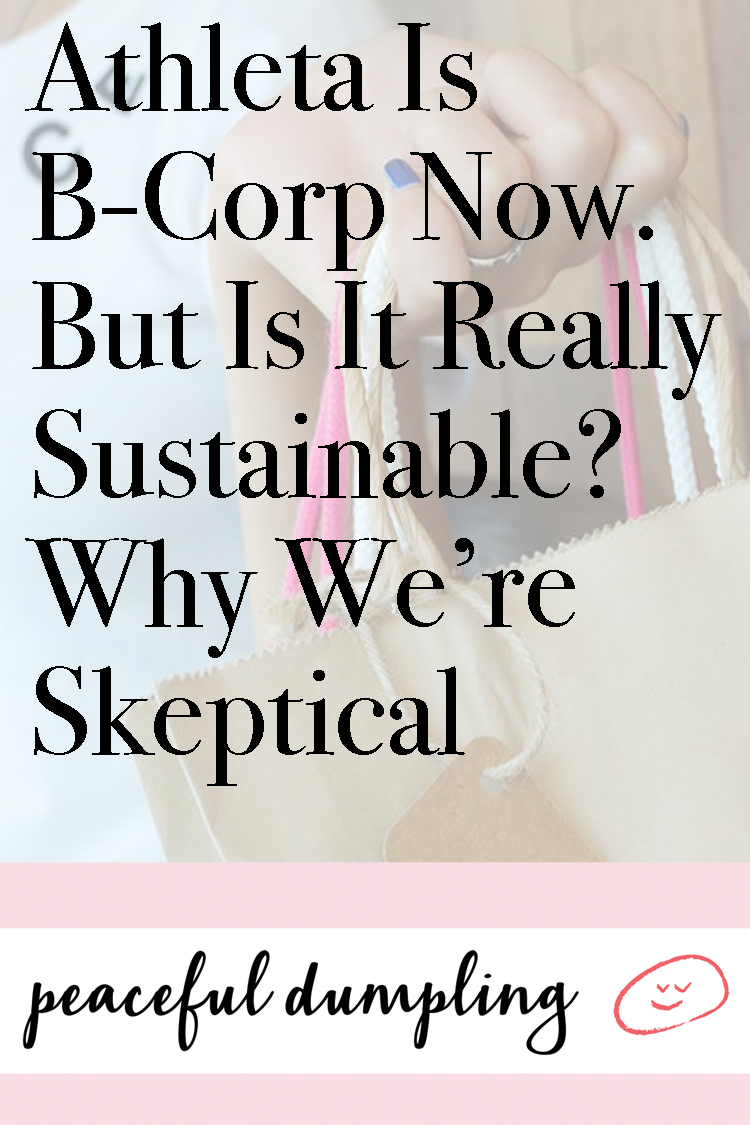In a stack of “to save” papers on my kitchen table are pages that I tore out of a recent Athleta catalog. While I don’t remember signing up to get this mailing I ultimately throw in the recycling bin, I inevitably smile upon its arrival every so often. I just love its feel-good spreads illustrating female athletes of all shapes, sizes, and skin colors slaying their sports—whether it be yoga, the mainstay of the brand’s audience, running, HIIT, surfing, or athleisurely moving between sport and brunch in a breezy cotton dress or joggers. The catalog is on par with Vogue for me in terms of aspirations, for feeling comfortable and strong in my body is a big #lifegoal; and I confess I sometimes succumb to thinking that purchasing products from companies with such excellent advertising will help me get there.

I’d say about half of my current activewear (which is fairly substantial given that I’m a yoga instructor and daily exerciser) is from Athleta, and I’ve been a loyal customer over the years. The day I discovered a tiny pinhole in my favorite, five-year-old leggings, I exclaimed in the middle of my teacher training workshop such that someone thought I’d injured myself. I find the styles to be flattering and truly transitional between studio and street, although the sizing is less consistent than I’d like it to be.
And yet I only tore out a handful of items for my wishlist because, despite all these pros, Athleta remains part of the Gap corporation, which in the past has been notorious for committing crimes of fast fashion: abusive labor conditions, green-washing tactics, and unsustainable production to meet the demand of their massive inventory turnover.
The company has made efforts to turn themselves around, including by hiring a “sustainability expert” David Hayer in June 2017 and recently pledging to conserve 10 billion liters of water by 2020 in an effort to “recognize the responsibility and the opportunity we have to reduce the amount of water used to create our products,” says Executive Vice President of Global Sourcing, Christophe Roussel. Athleta itself has remained on my consumer radar namely for its more outward-facing initiatives of this sort, including items labeled “fair trade.” The diversity of their models’ ethnicities and body types has also been a check in the “pro” column for me for a long time, complementing the set of admirable “core values” on their site.

When I walked past my local store last week and saw a huge, proud sign in the window announcing their new (March 2018) B Corp status, part of me felt a huge rush of relief. Finally, a legit organization recognized the efforts of the brand-within-a-brand such that my buyer’s remorse could be forever banished. The certification made all of Athleta’s lofty goals for 2020, shared by Gap, Inc., somehow more credible in my mind. These include empowering women workers, using sustainable fibers in fabrics, and reducing water consumption and waste. Their progress isn’t great so far, less than 50 percent on all fronts, but hey, they’re human, too, right? And it’s better than the companies that do nothing of this sort.

What is it about the B Corp badge of honor that prompted a shift in my thinking? The organization is a true trailblazer in setting standards for social and environmental impact as well as truth-telling toward the public. Since its initiation, over 2,000 companies have been certified across 130 industries and in 50 countries. Some of my favorite brands boast the grade, including Eileen Fisher (December 2015) and AllBirds (December 2016). Athleta’s overall B-score came in at an 84, just four points above the acceptable grade of 80 (total of 200 is possible), but which is still way higher than the median score of 55. Where they shone was in the categories of “environment” (materials used and wasted) and “community” (relationship with suppliers, local community, diversity, and charitable work).
The company highlighted these points in their public statement after the certification was announced. CEO and President Nancy Green emphasized the initiatives for female empowerment across the board—from its manufacturing/supply workers (Fair Trade and P.A.C.E., or Personal Advancement and Career Enhancement), to employee volunteer programs, all the way out to its customer base where women of all ages and stripes are encouraged to feel worth it (known as the “Power of She” campaign, aka the one that won over me and many other buyers throughout the years):
We believe with Athleta’s growth, comes even greater responsibility to lead as a force for good, Athleta has been at the forefront of empowering and celebrating women for two decades; this B Corp Certification accelerates our course forward as a purpose-driven brand, honoring our mission to ignite a community of healthy, confident, active women and girls; and cementing our commitment to environmental sustainability.
You’re probably guessing that I ran into the store and destroyed my wish list, taking the opportunity to support a company now legally bound to stick to these values I hold so dear to my heart and try to deploy in my everyday life. But surprise, dear reader: I paused before the sign, tilted my head to check the alignment of the mannequin sporting awesome white mesh-cut-out leggings in a yoga pose I knew all too well, and kept walking.
You see, labels aren’t everything. B Corp is akin to the USDA Organic certification for food, which as we all know is full of holes and puts up barriers for truly organic growers who can’t afford the certification process; it’s also recently eliminated the policies ensuring animal welfare standards. I’m not saying that that the B Corp committee made an oversight or that it diminishes the brand’s status as a leader in eco-fashion. What I am saying is that there are more factors to consider, just like choosing to buy produce from a local, but non-“organic” farmer instead of the one at the store with a fancy label (and accompanying price tag) that was shipped across the country days (or longer) ago.
What remains a thorn in my side about Athleta is its wanting to have its vegan cake and eat it, too. For all its good intentions, it doesn’t seem quite able to get off the toxic marketing train that is sullying our understanding of the yoga practice as well as of what true beauty and success means for women. To state that they intend to empower women through clothing that runs $79.00 (for leggings) and up strikes me as a gross contradiction; all of my purchases have been made during times of 50-percent-off-clearance sales, with coupons, or with my “fitpro” (fitness professional, a well-known underpaying field) discount. The ability to offer such price-cuts suggests that their original mark-up is inflated—and perhaps representative of the true worth or quality of the items. It also means those cute leggings I was eyeing in the window wouldn’t make it to my closet for some time, well past their original season, and would keep me tethered to the cycles of commerce driving my self-worth.
Moreover, feeling good and healthy in your body is not dependent on what you put on it (though it does make a difference). Sure, I’ve claimed to feel more “open” when I’m wearing my favorite leggings, but in essence that positive-reinforcement came from my own inner storytelling and could have been achieved with a soothing cup of tea just as easily. When we look at what Athleta puts on our bodies, in fact, it’s not so great either. Forty percent of the materials might be sustainable, but that means 60 percent isn’t. The fitness apparel industry is plagued by its microfiber pollution, which is the result of making and washing synthetic materials (which hold odor more, and even more so after a workout). The plastic particles in fleece, leggings, shorts, etc. seep into water supplies, and thereby into our and animals’ food. This amounts to an additional 14.4 plastic bottles of waste per family per year in the U.S.—just from doing the laundry! Patagonia (B Corp since 2011) made headlines in 2016 for recognizing the plastic problem and calling for more research on alternatives, but there’s a long way to go.
Plus, my stack of torn out pages wasn’t bigger (or in fact just the whole catalog) because of how few fair trade items are on offer, or at least advertised in the catalog.
Transparency, this is not.
For now, I remain a hesitant shopper for all these reasons, though I commend Athleta for making such public commitments to better practices. I personally feel I can make more of a difference (and shrink my eco-footprint) by consuming less, not more of even the greenest products. In fact, I just resolved to a year of no new things, starting from my last purchase on March 19. I’ll cultivate my she-power not through what I wear on the outside, but by being a more compassionate, generous, and truthful woman on the inside—a self-image no amount of money, or brand logo, could buy.

What are your sustainability goals? Let us know in the comments below!
Also by Jennifer: Beyond Leggings—How A NYC Editor/Yoga Teacher Dresses Sustainably & Chicly
Related: Sustainable Fashion Isn’t Just For Rich People. Why This Lifestyle Is For All Of Us
This Surprise Material Is Taking Sustainable Fashion By Storm–Why You’ll Love It
Get more like this–sign up for our newsletter for exclusive inspirational content!
__
Photos: Pexels, Athleta.com
